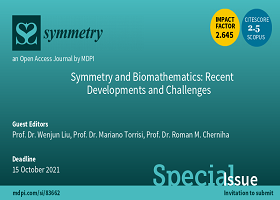Symmetry and Biomathematics: Recent Developments and Challenges
A special issue of Symmetry (ISSN 2073-8994). This special issue belongs to the section "Mathematics".
Deadline for manuscript submissions: closed (17 February 2023) | Viewed by 7204

Special Issue Editors
Interests: partial differential equations; asymptotic analysis; nonlinear waves; mathematical physics; soliton theory; nonlinear analysis; biomedicine; biomathematics
Interests: group methods for nonlinear differential equations (both ODEs and PDEs); reduction techniques for the search of exact solutions of PDEs; applications of the group methods to reaction diffusion models, such as nonlinear governing equations modeling population dynamics and biomathematical problems; nonlinear diffusion and propagation of heat
Special Issues, Collections and Topics in MDPI journals
2. School of Mathematical Sciences, University of Nottingham, University Park, Nottingham NG7 2RD, UK
Interests: non-linear pdes: lie and conditional symmetries, exact solutions and their properties; application of symmetry-based methods for analytical solving nonlinear initial and boundary value problems arising in mathematical physics and mathematical biology
Special Issues, Collections and Topics in MDPI journals
Special Issue Information
Dear Colleagues,
Symmetry and asymmetry have always been ubiquitous in nature, especially in the origin of life, biological evolution and the process of disease, which has attracted extensive attention of biologists, biomathematics and biomedical researchers.
The law of motion of matter can be studied from the angle of symmetry transformation and symmetry operation. Therefore, it is very enlightening to start from group theory. It is of great significance to search for the symmetries that occur in the laws of biology, to study the symmetries that occur in biological systems at the molecular and macro level, and to discuss the process of the symmetries that gradually break down in the course of disease development.
The aim of the present Special Issue is to emphasize the recent developments and challenges in symmetry and biomathematics. For example, we focus on the latest research on symmetry and travelling wave analysis, on transformations for models in biomathematics, on symmetry for disease models (especially related to the COVID-19 pandemic), on symmetry in neuroscience, and on pulse propagation in biological systems. Symmetry analysis of stochastic real-world models and models based on nonlinear reaction-diffusion equations are also what we are interested in.
We are soliciting contributions (research and review articles) covering a broad range of topics on all the above-mentioned topics.
Prof. Dr. Wenjun Liu
Prof. Dr. Mariano Torrisi
Prof. Dr. Roman M. Cherniha
Guest Editors
Manuscript Submission Information
Manuscripts should be submitted online at www.mdpi.com by registering and logging in to this website. Once you are registered, click here to go to the submission form. Manuscripts can be submitted until the deadline. All submissions that pass pre-check are peer-reviewed. Accepted papers will be published continuously in the journal (as soon as accepted) and will be listed together on the special issue website. Research articles, review articles as well as short communications are invited. For planned papers, a title and short abstract (about 100 words) can be sent to the Editorial Office for announcement on this website.
Submitted manuscripts should not have been published previously, nor be under consideration for publication elsewhere (except conference proceedings papers). All manuscripts are thoroughly refereed through a single-blind peer-review process. A guide for authors and other relevant information for submission of manuscripts is available on the Instructions for Authors page. Symmetry is an international peer-reviewed open access monthly journal published by MDPI.
Please visit the Instructions for Authors page before submitting a manuscript. The Article Processing Charge (APC) for publication in this open access journal is 2400 CHF (Swiss Francs). Submitted papers should be well formatted and use good English. Authors may use MDPI's English editing service prior to publication or during author revisions.
Keywords
- travelling wave analysis
- lie symmetry
- conditional and nonclassical symmetry
- exact solutions of nonlinear PDEs
- transformations for models in biomathematics
- evolution of disease models
- development of population models
- symmetry analysis of stochastic models
- pulse propagation in biological systems
- symmetry in neuroscience
- stability and instability of biological systems
Benefits of Publishing in a Special Issue
- Ease of navigation: Grouping papers by topic helps scholars navigate broad scope journals more efficiently.
- Greater discoverability: Special Issues support the reach and impact of scientific research. Articles in Special Issues are more discoverable and cited more frequently.
- Expansion of research network: Special Issues facilitate connections among authors, fostering scientific collaborations.
- External promotion: Articles in Special Issues are often promoted through the journal's social media, increasing their visibility.
- e-Book format: Special Issues with more than 10 articles can be published as dedicated e-books, ensuring wide and rapid dissemination.
Further information on MDPI's Special Issue polices can be found here.







